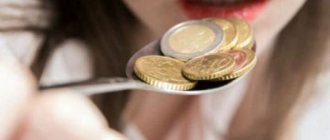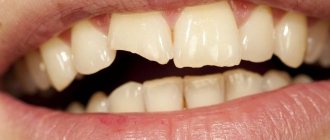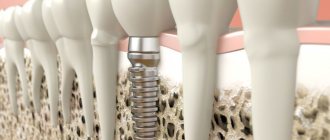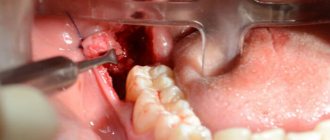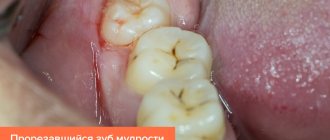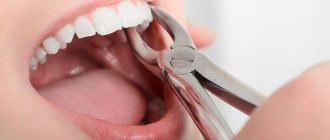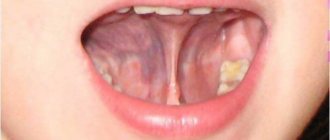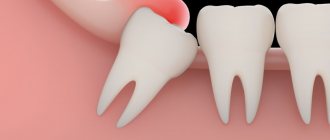Why does a bitter taste appear in the mouth after eating?
Bitterness in the mouth that occurs in the morning may be a consequence of age-related changes in taste buds or a symptom of a disease of the gastrointestinal tract.
What to do if you have a bitter taste in your mouth is the topic of today’s review. From the article you will learn about the main causes and treatment of this manifestation. Causes of bitterness:
- inflammatory diseases of the biliary tract (bitterness occurs in the morning);
- liver diseases (pain in the right side (hypochondrium) and bitterness appear after physical activity);
- stomach diseases (bitterness occurs after eating);
- parasitic infestations;
- pregnancy;
- diseases of the oral cavity;
- taking medications;
- endocrine diseases.
When should you see a doctor if you have bitterness in your mouth?
If the bitter taste in the mouth persists for a long time or is often bothersome, you should consult your doctor. A specialist will help identify the connection between a symptom and a specific disease and prescribe the necessary diagnostic tests and treatment.
If bitterness in the mouth is caused by poor oral hygiene, you need to reconsider your approach to caring for your teeth, brush them at least 2 times a day (including your tongue) to prevent the formation of plaque, consult a dentist for professional oral hygiene, treatment of caries, gingivitis and other dental diseases. If bitterness in the mouth is associated with acid reflux, follow the treatment regimen prescribed by the gastroenterologist, avoid eating fatty, fried and spicy foods, processed foods, smoking and alcohol, have dinner a few hours before bed, chew food thoroughly, eat a healthy diet, try to reduce weight and avoid stress.
Diseases that cause bitterness
Disorders of the biliary tract and liver function. Bitterness in this case, as a rule, appears in the morning. Symptoms of diseases of the gallbladder and liver are a metallic taste in the mouth, darkish color of urine, yellowness of the skin, white coating on the tongue.
Gastrointestinal diseases. Patients often ask: “could bitterness in the mouth be a symptom of stomach disease?” Undoubtedly. There are several diseases whose characteristic manifestations are bitterness. Gastric dyspepsia, gastroesophageal reflux disease, gastritis and ulcers. Additional symptoms in this case will be heartburn, a feeling of heaviness in the stomach, flatulence and nausea.
Oral diseases. Most often we are talking about dental problems. Inflammation of the mucous membrane and soft tissues can cause changes in taste.
Medications. When taking antibacterial, antihypertensive, antidiabetic and hormonal drugs, a bitter taste may occur in the mouth. Read on to learn how to remove bitterness in your mouth after taking antibiotics.
Pregnancy. The cause of bitterness is hormonal changes in the body.
Endocrine diseases. If the thyroid gland and adrenal glands malfunction, a hormonal imbalance may occur, causing spasm of the bile ducts.
Stomach problems
The appearance of bitterness in the mouth also indicates stomach problems. It is often complicated by additional indications: bloating, nausea, heartburn, stomach pain, belching and a yellow-white coating on the tongue.
What to do
- Restore proper functioning of the digestive organs: remove heavy fatty and smoked foods, spices, salty and fried foods from the diet.
- Take medications that normalize the functioning of the stomach and intestines (as prescribed by a doctor).
Attention!
Bitterness in the morning, together with pain in the right side, more often indicates problems with the liver and gall bladder, short-term and after meals - about problems with the duodenum and gastrointestinal tract, hormonal disorders.
Bitterness in the mouth: symptoms
Bitterness in the mouth, the cause of which is a disease of the internal organs, is not an isolated symptom. Depending on the pathology, it may be accompanied by dry mouth, white coating on the tongue, belching, nausea and vomiting.
Plaque on the tongue due to internal pathology:
- a gray-white coating, bitterness in the mouth in the morning and an unpleasant odor indicate dyspeptic disorders, ulcers or gastritis;
- thick white coating with a wound surface - fungal infection or thrush;
- white with spots or slightly yellowish coating – a sign of gastritis;
- brown coating at the base of the tongue – intestinal intoxication, iron deficiency or “smoker’s syndrome”;
- white plaque with red spots (“geographical” tongue) – chronic diseases of internal organs.
The treatment of bitterness in the mouth will be discussed further. Medication, traditional medicine recipes or complex therapy – which is better?
On our website you will find more detailed information. Our doctors will answer all questions, for example, how to get rid of constant bitterness in the mouth after gallbladder removal. You can make an appointment using the above numbers.
Bitterness in the mouth
Ulcer
Vomit
Diabetes
Gastritis
21564 08 February
IMPORTANT!
The information in this section cannot be used for self-diagnosis and self-treatment.
In case of pain or other exacerbation of the disease, diagnostic tests should be prescribed only by the attending physician. To make a diagnosis and properly prescribe treatment, you should contact your doctor. Bitterness in the mouth: causes of occurrence, what diseases it occurs with, diagnosis and treatment methods.
Definition
Very often, when a symptom such as a bitter taste in the mouth appears, patients do not rush to visit a doctor, but try to cope with it on their own, eating or washing down the unpleasant sensation, as well as using all kinds of rinses. In order to effectively get rid of bitterness in the mouth, you should consider the types and possible causes of its occurrence.
Types of bitterness in the mouth
In most cases, bitterness in the mouth is felt in the morning - immediately after waking up. After hygiene measures and eating, it may disappear until the next morning.
Sometimes the bitter taste returns after physical work, sharp bends or in a horizontal position.
Bitterness may occur after taking medications (antibiotics, analgesics, anti-inflammatory, anticonvulsants, lipid-lowering, antihypertensive, hypnotics) or certain foods (for example, pine nuts and almonds), which indicates that it is not associated with diseases.
Sometimes patients, especially older ones, complain about the bitter taste of any food.
Possible causes of bitterness in the mouth
Poor oral hygiene and inflammatory diseases
(most often gums) can lead to bitterness in the mouth In these cases, food debris, accumulating between the teeth and in the gum pockets, begins to decompose and gives an unpleasant taste, accompanied by a putrid odor.
A fairly common cause of bitter taste is the accumulation of combustion products of tobacco mixtures (tars) on the oral mucosa.
However, the main reason for complaints of a bitter taste is associated with reflux of bile into the esophagus and oral cavity.
Usually this is not the only symptom; sometimes it is accompanied by vomiting bile, belching, pain and a feeling of bloating in the stomach. Pain in the upper abdomen and right hypochondrium is also possible, sometimes it radiates to the back and/or the right subscapular region. The pain does not change or decrease after bowel movements, when changing body position, or after taking antacids (drugs that relieve heartburn).
The reason for the reflux of bile into the esophagus is most often impaired motility (dyskinesia) of the gastrointestinal tract and biliary tract. Bile is necessary for the emulsification of fats, which determines its production and entry into the duodenum.
When motility is impaired, bile from the duodenum flows back into the stomach (duodenogastric reflux).
And in cases where the lower esophageal sphincter is also open, bile enters the esophagus (duodenogastroesophageal reflux) and the oral cavity, causing a feeling of bitterness.
This occurs with duodenal ulcers, obesity, diabetes, a low-calorie diet, during pregnancy, and also when feeding through a nasogastric tube (a thin tube is passed through the nose into the stomach so that liquid food can be delivered. This is necessary if the patient does not can eat food in the usual way.).
Feeding through a nasogastric tube
Bile reflux also occurs due to its stagnation in the duodenum (duodenostasis) after removal of the gallbladder. Overflow of the duodenum leads to stimulation of the vomiting center and causes nausea, vomiting and a bitter taste in the mouth.
The feeling of bitterness in the mouth due to impaired motility of the biliary tract also accompanies a number of systemic diseases, which are treated by a rheumatologist.
Biliary dyskinesia is characteristic of hormonal disorders (including hormone replacement therapy). In case of disorders of the brain, in particular with damage to the medulla oblongata, dyskinesia is caused by a violation of the nervous and endocrine regulation of the biliary (bile) tract.
Which doctors should I contact if I have bitterness in my mouth?
If a feeling of bitterness appears in the mouth, the first thing you need to do is sanitize the oral cavity by visiting a dentist.
If there are no dental problems, you should contact us to receive a referral for the necessary tests. After interviewing the patient and receiving the results of blood and urine tests, treatment can continue or.
Diagnostics and examinations for the appearance of bitterness in the mouth
If the examination does not reveal dental problems, as well as signs of rheumatological (systemic) diseases, the doctor prescribes the patient clinical and biochemical blood tests to assess the level of liver enzymes (ALT, AST), bilirubin and alkaline phosphatase, and a general urine test.
Diagnosis and treatment of bitterness in the mouth
If the bitterness in the mouth is constant, consultation with a specialist is necessary. In this case we are talking about a gastroenterologist. Since the treatment is mainly complex, consultation with other doctors may be required, namely a gynecologist, endocrinologist or psychotherapist.
After examining the patient and collecting anamnesis, the doctor may prescribe additional laboratory and instrumental research methods, which include:
- General analysis and blood biochemistry;
- blood test for hormones;
- general urine analysis;
- ultrasound examination of the gastrointestinal tract;
- X-ray and FGSD.
Based on the examination results, the specialist will prescribe treatment for bitterness in the mouth. The course of therapy is strictly individual, taking into account the patient’s condition and the course of the disease.
4.Treatment
It is equally unrealistic to describe all specific treatment methods, or at least outline a general methodology for eliminating the bitter taste in the mouth. It should be remembered that this is not a disease, but a symptom, and most often not the only one, therefore the further therapeutic strategy will be determined by the results of the examination. In some cases, it is enough to give up bad habits or normalize your lifestyle, in others, long-term and complex highly specialized treatment may be required, and sometimes bitterness in the mouth becomes a kind of “premonition” of a clearly necessary surgical intervention.
One way or another, of course, this phenomenon should not be ignored.
Drug therapy for bitterness
Treatment depends on the pathology causing this manifestation. If we are talking about gastrointestinal diseases, then it is appropriate to prescribe medications aimed at restoring digestive function (almagel, vikalin, de-nol, motoricum). In case of disturbances in the outflow of bile, choleretic drugs and decoctions of choleretic herbs are indicated. Treatment of bitterness in the mouth in the morning caused by stress includes the prescription of sedatives based on hawthorn, valerian, motherwort, etc. Consultations with a psychotherapist are an excellent addition to taking sedatives. It is best to ask your doctor about how to treat severe bitterness in the mouth during pregnancy.
Bitterness in the mouth after eating
04.09.2021
A woman should be ideal, or at least strive for ideal. We are used to hearing this opinion, but this is a wrong opinion, because both men and women should take care of their beauty and health. You won't have a great appearance if you don't have health!
Keeping yourself in shape is not easy, but our body is an assistant that gives signals. One of the unpleasant signals that each of us has encountered is bitterness in the mouth . Such an unpleasant symptom cannot go unnoticed and not bother a person. First you need to find out what causes this symptom.
Why is there bitterness in the mouth?
Bitterness in the mouth occurs if: a person has been on treatment for a long time and, as a result, has used antibiotics. Also, if a course of drug treatment was prescribed that was not suitable for the patient. There is a category of people who experience bitterness in the mouth due to food intake, for example, spicy food, spoiled food.
Bitterness in the mouth can occur constantly if a person has constant stomach . If a person is under stress, such an unpleasant feeling may also occur. Pay attention to your diet. What you eat and how your body reacts to it. What time of day do you eat food? Pine nuts can cause bitterness, as they are choleretic. What kind of nuts you bought is also important. For example, Chinese nuts provoke heartburn and bitterness. In general, be careful with foreign products, as food and drink differ in each country. So if you are going to go on vacation to another country and already have problems with the stomach , intestines , gall and liver, carefully select your diet.
Another reason for the appearance of bitterness in the mouth after eating food is a banquet feast. For example, you were on a diet and then you found yourself at a luxurious banquet; naturally, you couldn’t deny yourself. Large meals, changes in diet, and too fatty foods provoke many diseases. Bitterness in the mouth after eating is a symptom that cannot be ignored, even if your general health does not cause concern. It is necessary to undergo examinations of the gallbladder , liver , and pancreas .
Bitterness in the mouth after eating can occur in pregnant women - such a symptom is considered to be the norm, because a pregnant woman experiences hormonal changes, other physiological changes, and increased acidity may occur.
What else could a bitter taste in the mouth mean?
Do not rush to raise the alarm the first time you feel an unpleasant sensation. This does not always indicate a disease (serious illness), the course of which is difficult to stop, it is just a signal to you. This signal indicates that you need to change your diet. Review the foods you eat most often, reduce the amount of fatty foods, sweets, spicy foods, and drink less carbonated water.
Switch to proper nutrition, add sports and light exercises to your daily routine. Swimming and jogging won't hurt anyone! You shouldn’t punish yourself and go on a strict diet , or even worse, don’t eat at all, but drink water. Women like to use such harsh methods in practice.
How to get rid of bitterness in your mouth? Folk remedies
If you cannot visit a doctor , and the bitterness in your mouth bothers you and you are afraid for your health, conduct an experiment: add beets to the salad, you can boil a piece of beets and eat it with plain water. Then pay attention to the color of your urine ; if it has a red tint, it means you have serious problems, don’t hesitate! your doctor immediately .
Bitterness in the mouth is treated with horseradish and honey. Horseradish is grated and milk is added, then this mixture must be infused and this medicine must be taken several times a day in small portions (about one sip). You can cleanse your body: drink plenty of water, at least two liters of water.
You can drink decoctions, for example, decoction of rose hips, viburnum, mint, currants. It is useful to consume natural juices, make them yourself: carrot, strawberry, cherry, pumpkin, tomato juices. If the cause of bitterness in the mouth is stress, it is necessary to overcome the stressful state and remove external irritants.
You can drink sedative herbs, medications, even work with specialists - psychologists. When stress goes away, your health problem goes away. Take care of your health, this is your beauty. Don’t put off obvious problems until later and be healthy!
Published in Gastroentorology Premium Clinic
Treatment of bitterness with folk remedies
Herbal medicine is appropriate in complex treatment under the supervision of a specialist. Chamomile infusion, flax seed jelly, and corn silk decoction will help get rid of such an unpleasant symptom. Therapy with freshly squeezed juices has proven itself well. For this purpose, potato is used, which activates the intestines and eliminates heartburn, carrot, beetroot, which is effective for diseases of the biliary tract, and cucumber. Juices have a general strengthening effect, help cleanse the organs of toxins and normalize digestion processes.
Treatment of bitterness in the mouth in the morning: preventive measures
If bitterness in the mouth is episodic, you should pay attention first of all to your diet. It is necessary to limit the consumption of fatty and smoked foods, coffee, strong tea, processed foods and sweets. Focus on cereals, fresh vegetables and dairy products. You should eat small meals, but often. Normalize your drinking regime. Stop smoking and alcohol. If the cause of bitterness is stressful situations, make an appointment with a psychotherapist. Our doctors will also help solve the problem. If you are concerned about the question “why does a bitter taste appear in your mouth after eating,” make an appointment right now.
Related services: Family doctor consultation Videogastroduodenoscopy
Why does bitterness occur in the mouth? Recommendations for heartburn
14.04.2021
Bitterness in the mouth is a symptom that worries many people. And almost 100 percent of all people with a symptom of bitterness in the mouth are sure that talking about bile and gall bladder . Let's figure it out.
With what part of the tongue do we feel bitterness? We feel bitterness through the papillae on the tongue, usually the back wall of the tongue, that is, the root of the tongue. has absolutely nothing to do with bitterness in the mouth Bile is released into the duodenum, and then goes down the intestines , and our stool is colored brown, thanks to the pigments of bile. Bile cannot get into our mouths .
Therefore, the gallbladder and liver , and bile in general, in principle, have nothing to do with bitterness, and most often such sensations are associated with the effect of hydrochloric acid from the stomach on the walls of the esophagus . Why is this happening?
Everyone knows that the stomach contains hydrochloric acid. Ideally, hydrochloric acid should only be in the stomach and should not be thrown the esophagus For this purpose, there is a sphincter at the bottom of the esophagus - this is a muscle ring. It is closed all the time, opens only when food passes through the esophagus , lets food into the stomach , then closes again and should not return. It happens that it does not close or closes poorly. Acid from the stomach goes back into the esophagus and burns it. The esophagus is not used to the effects of acid, because the stomach is protected from acid, but the esophagus is not. Therefore, the esophagus immediately sends a signal to the brain , and the brain, in response to this signal, sends a signal to the salivary glands so that they secrete very alkaline saliva. This alkaline saliva, when swallowed, helps quench acid that irritates the esophagus . And this alkaline saliva has a very bitter taste.
The bitter taste in the mouth is the taste of alkaline saliva, which is produced in response to a burn in the esophagus . A disease that may be accompanied by a bitter taste is called gastroesophageal reflux disease , or popularly heartburn .
What should people who experience heartburn (bitterness in the mouth) not do?
In order to prevent this sphincter between the stomach and esophagus , some rules should be followed. Firstly, absolutely do not smoke. Secondly, avoid caffeinated products. It could be coffee, chocolate, cola, cocoa and so on. The next item is mint. All products containing mint should be avoided. These are chewing gum, candies, mint breath fresheners, mint teas. It is necessary to exclude onions, garlic in any form: fried, steamed, it doesn’t matter, any onion and garlic, as well as fatty, fried foods. And also after eating, you should not take a horizontal position for two to three hours.
But you must understand that all this will help alleviate the symptoms of heartburn and you will feel less bitterness, but this will not get rid of the causes of their occurrence, so you must additionally seek professional medical help. At the first symptoms, you should consult a doctor and have an examination - gastroscopy , so that the doctor can determine and help eliminate the cause of your heartburn . This could be a hernia , a burn, erosion, ulcer , or even the so-called Barrett's esophagus (and this is a precancerous disease).
Published in Gastroentorology Premium Clinic
